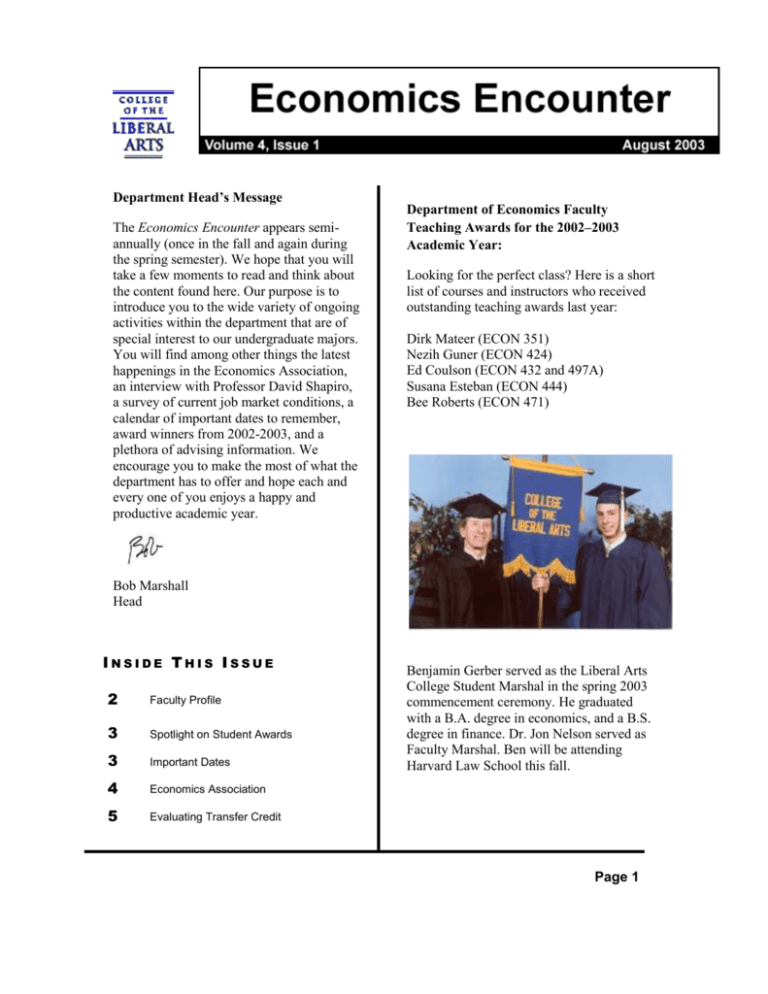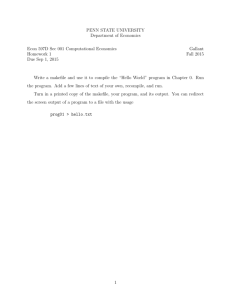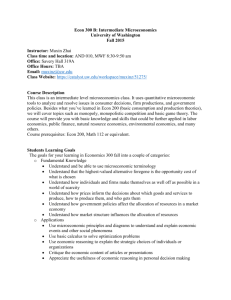The Economics Encounter is a new departmental publication that
advertisement

Department Head’s Message The Economics Encounter appears semiannually (once in the fall and again during the spring semester). We hope that you will take a few moments to read and think about the content found here. Our purpose is to introduce you to the wide variety of ongoing activities within the department that are of special interest to our undergraduate majors. You will find among other things the latest happenings in the Economics Association, an interview with Professor David Shapiro, a survey of current job market conditions, a calendar of important dates to remember, award winners from 2002-2003, and a plethora of advising information. We encourage you to make the most of what the department has to offer and hope each and every one of you enjoys a happy and productive academic year. Department of Economics Faculty Teaching Awards for the 2002–2003 Academic Year: Looking for the perfect class? Here is a short list of courses and instructors who received outstanding teaching awards last year: Dirk Mateer (ECON 351) Nezih Guner (ECON 424) Ed Coulson (ECON 432 and 497A) Susana Esteban (ECON 444) Bee Roberts (ECON 471) Bob Marshall Head INSIDE THIS ISSUE 2 Faculty Profile 3 Spotlight on Student Awards 3 Important Dates 4 Economics Association 5 Evaluating Transfer Credit Benjamin Gerber served as the Liberal Arts College Student Marshal in the spring 2003 commencement ceremony. He graduated with a B.A. degree in economics, and a B.S. degree in finance. Dr. Jon Nelson served as Faculty Marshal. Ben will be attending Harvard Law School this fall. Page 1 Faculty Profile–David Shapiro His office looks like a room that’s part of a cluttered warehouse holding articles from an African museum. There are masks and other artifacts that Professor David Shapiro has collected over the course of the past twentyfive years, during various stints teaching, doing research, and engaged in development work in sub-Saharan Africa. His research in Africa has focused on women’s education, employment, and fertility and fertility transition in sub-Saharan Africa. Earlier this year, he published a book (with B. Oleko Tambashe) summarizing much of his research in this area and entitled Kinshasa in Transition: Women’s Education, Employment, and Fertility. For the past five years, Professor Shapiro has served as Director of Undergraduate Studies in Economics, and he has also been Director of the Honors Program in Economics since 1987. Due to his administrative responsibilities, his teaching in recent years has been limited to the Fall Honors Seminar and the Honors Thesis class. However, in the spring semester he will be team teaching Economics 436, Economics of Discrimination. The course will be co-taught with Professor James B. Stewart of labor studies. Professor Shapiro earned his Ph.D. at Princeton University, and following a stint at The Ohio State University, he came to Penn State in 1980. According to Bob Marshall, Head of the Economics Department, “As Director of Undergraduate Studies, Professor Shapiro has shown remarkable dedication to the undergraduate program, the learning environment of our students, and the cultivation of career opportunities for future students. This kind of leadership is essential for success.” In recognition of his efforts, he received the President’s Award for Engagement with Students in the spring of 2002. In his spare time he enjoys playing basketball and working out, and feeding the fish in his pond. With his wife, Sharon, he also enjoys travel, and is hoping to spend his sabbatical year (2004-05) back in Africa, teaching and doing research. Page 2 Economics Majors Make Small Salary Gains According to the Summer 2003 issue of Salary Survey, a quarterly report published by the National Association of Colleges and Employers (NACE), economics majors saw average salary offers advance a scant 0.3 percent for an average of $40,084. This is in line with other fields. With the sluggish economy, and fewer jobs available, employers have not had to raise wages very much to attract quality workers. A comparison of economics majors with other disciplines: Discipline Average Salary Offer $40,084 $40,546 $34,628 $37,122 Increase/Decrease Economics 0.3 Accounting 2.0 Marketing 2.3 Business 1.9 Administration MIS $40,915 -4.2 English $30,157 5.9 Psychology $27,454 3.8 History $32,108 2.9 Source: www.naceweb.org/press/ Spotlight on Student Awards for 2002– 2003 Sam Bonsall has received the Monroe Newman Award. This award recognizes a junior for outstanding promise and achievement in the study of economics. Michael Macko received the William Martin Award. This award is presented annually to an outstanding senior majoring in economics and exhibiting the traits of Professor Martin, namely, dedication to scholarship and awareness of the University in the community. Allie Martin has received the Richard Rosenberg Award. This award is presented annually for outstanding service to the department. Michael Macko also received the Edward C. Budd Award for the best honors thesis. His thesis, The Economics of Language, asserts that our overall knowledge of language can be enhanced through economics and viceversa. Important Dates: September 2 Fall classes begin Please Note: Although it is a Tuesday, classes will follow a Friday schedule. September 10 Drop/add period ends September 11 Drop/add with $6.00 fee begins September 15 Deadline to activate intent to graduate October 10 Study Day—No Classes October 27 Final exam conflict filing period begins November 14 Final exam conflict filing period ends November 19 Late drop deadline November 26-28 Thanksgiving Holiday December 12 Withdrawal deadline Classes end December 15-19 Final exams December 20 Commencement Page 3 Undergraduate Economics Association The Economics Association encourages you to join! The club has three main functions: to educate, network and have fun. Last year our membership expanded significantly and this enabled us to offer a wider range of services and afford our membership additional opportunities to get involved compared to the past. If you are not yet a member, we hope you’ll visit our first meeting early in the fall. In addition to our regular meetings and peer tutoring program, we also participated in two signature activities during 2002-2003. The first was an economic impact study for the State Theatre revitalization effort. Our other big event was an overnight bus trip to NYC to take a behind-the-scenes tour of the stock exchange. The trip was awesome. Similar plans are in the works for this coming spring. Networking: This fall we plan on holding a panel discussion with Penn State economics alumni regarding job prospects for 2004. In addition, we are planning to hold a symposium on current economic issues. Furthermore, we have created a test bank of old exams. The Economics Association offers copies of exams for a nominal charge and we are always collecting new versions. Anyone who submits a new exam gains a credit for a copy of another exam. Don’t suffer alone when you can share your joys and frustrations with others. The chief topics for discussion in the club are exams and which courses to take. We were fortunate last year to have Allie Martin as our leader. Allie took the club to the next level and enabled us to establish a real presence on campus. With a new slate of energetic leaders ready to go, this year figures to be even better. Education: The Economics Association began a new initiative last year to help tutor students in ECON 2 and ECON 4. This year, we plan to expand and improve our service. Club members provide weekly tutoring to anyone who is interested. Please contact one of the club officers or visit our Web site: www.clubs.psu.edu/econ/ to volunteer. Tutoring is a great way to share your gift of economics with students who are struggling, and it looks great on a resume! Fun: Last year, we ate lots of pizza at our meetings, and had an active social agenda planned. Please stop by and get to know your fellow majors, minors, and other interested students. We’ll also be planning another big trip. Page 4 Course Updates Enrollment in the department has increased dramatically over the last few years and this has allowed the department to offer a broader slate of classes. However, enrollment has expanded more quickly than available space in most upper-level courses. As a result, most of the 300-level and 400level classes are full. If you are a major and intend to graduate this semester, please see your advisor to gain admission to a class. Majors who are not graduating should contact Gay Catherman in 609 Kern. Do not contact the instructor. However, one course, ECON 497B, Personnel Economics, has space available. The course will discuss wage and compensation issues and it is a perfect fit for anyone who has an interest in labor economics. Given the exceptionally strong demand for the ECON classes this fall, students are strongly encouraged to register for the spring 2004 offerings as soon as possible. Please consult the registration timeline put out by the registrar for all the details. Furthermore, increased enrollments have allowed the department to schedule a more comprehensive set of summer offerings. This past summer, this included ECON 302, 304, 333, 351, 390 and 490. Fall Advising Hours Be sure to check when your advisor is available on the Department Web site: www.econ.psu.edu. Advising schedules are listed in the undergraduate program header. Please remember that finals week is reserved for emergency cases and that advising should be done during the regular semester. Evaluating Transfer Credit New!!! A transfer evaluation database is now available on the Penn State Admissions Web page: http://www.psu.edu/admissions/ (click on the “Evaluate Transfer Courses” button). This site gives you the opportunity to see how courses you have taken, or plan to take, will transfer to Penn State from another institution. There are two ways to search the database; students can identify a course at another institution and search for its Penn State equivalent, or the reverse—they can identify a course they need at Penn State, and search for its equivalent elsewhere. This system provides an extraordinary amount of flexibility, so try it out! Suggestions for future issues and comments should be directed to Dirk Mateer (dmateer@psu.edu). Page 5 This publication is available in alternative media on request. The Pennsylvania State University is committed to the policy that all persons shall have equal access to programs, facilities, admission, and employment without regard to personal characteristics not related to ability, performance, or qualifications as determined by University policy or by state or federal authorities. It is the policy of the University to maintain an academic and work environment free of discrimination, including harassment. The Pennsylvania State University prohibits discrimination and harassment against any person because of age, ancestry, color, disability or handicap, national origin, race, religious creed, sex, sexual orientation, or veteran status. Discrimination or harassment against faculty, staff, or students will not be tolerated at The Pennsylvania State University. Direct all inquiries regarding the nondiscrimination policy to the Affirmative Action Director, The Pennsylvania State University, 328 Boucke Building, University Park, PA 16802-5901, tel. 814-865-4700/V, 814-863-1150/TTY. U.Ed. LBA 04-35 Page 6





